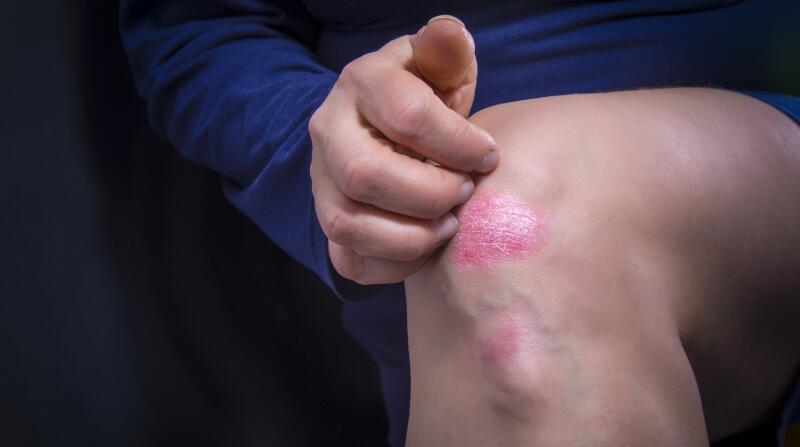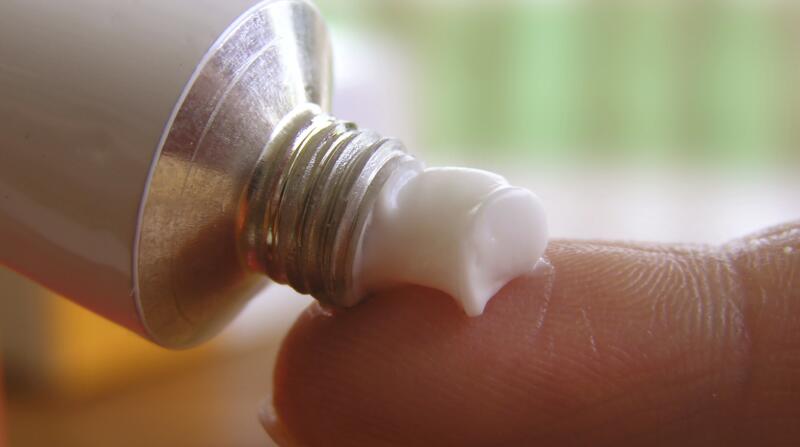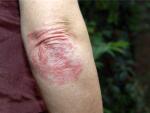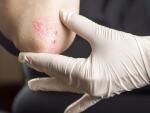Genital Psoriasis: 7 Things Doctors Want You to Know

Medically Reviewed By William C. Lloyd III, MD, FACS
Written By Nancy LeBrun on September 17, 2020
-
 Genital psoriasis doesn’t have to change how you live your life.Genital psoriasis is a skin condition that causes itching and burning, and shows up as smooth, red patches on the genitals or nearby areas, such as the upper thighs, pubic area, buttock, and folds in the skin around the groin. When it’s in the creases, it is inverse psoriasis. It’s not contagious and should not affect sexual function, but genital psoriasis can still have a big impact on the affected individual’s sex life and intimacy. Here, skin experts explain that genital psoriasis can be treated successfully and why it’s important to see a dermatologist.
Genital psoriasis doesn’t have to change how you live your life.Genital psoriasis is a skin condition that causes itching and burning, and shows up as smooth, red patches on the genitals or nearby areas, such as the upper thighs, pubic area, buttock, and folds in the skin around the groin. When it’s in the creases, it is inverse psoriasis. It’s not contagious and should not affect sexual function, but genital psoriasis can still have a big impact on the affected individual’s sex life and intimacy. Here, skin experts explain that genital psoriasis can be treated successfully and why it’s important to see a dermatologist. -
 1. “Biologically, genital psoriasis is just like any other kind of psoriasis.”“It’s exactly the same thing under the microscope as psoriasis anywhere else. However, how it looks to the naked eye is a little different because the skin of the genital area is thinner. It’s a little more sensitive, so when psoriasis shows up in the genital area, it’s sort of shiny and sometimes flatter,” says Lawrence Green, MD, board member of the National Psoriasis Foundation. “The difference really lies in the clinical appearance, and the impact it can have on quality of life,” adds Adam Friedman, MD, Associate Professor of Dermatology, George Washington School of Medicine and Health Sciences in Washington, D.C.
1. “Biologically, genital psoriasis is just like any other kind of psoriasis.”“It’s exactly the same thing under the microscope as psoriasis anywhere else. However, how it looks to the naked eye is a little different because the skin of the genital area is thinner. It’s a little more sensitive, so when psoriasis shows up in the genital area, it’s sort of shiny and sometimes flatter,” says Lawrence Green, MD, board member of the National Psoriasis Foundation. “The difference really lies in the clinical appearance, and the impact it can have on quality of life,” adds Adam Friedman, MD, Associate Professor of Dermatology, George Washington School of Medicine and Health Sciences in Washington, D.C. -
-
 2. “Genital psoriasis is common among people with psoriasis.”“I see it fairly often. Everyone who has psoriasis can get it—there’s no rhyme or reason. Psoriasis can be anywhere, anytime, anyplace on the skin—the genitals is just one place it can be,” says Dr. Green. “What’s unique about genital psoriasis is that because you get kind of thin, red patches or very thin plaques, it is very often misdiagnosed,” says Dr. Friedman. “The person that suffers with this may not know they have psoriasis, so they don’t get relief. Genital psoriasis is tricky—it doesn’t look like your textbook picture [of psoriasis], and diagnosis and treatment can be delayed,” says Dr. Friedman.
2. “Genital psoriasis is common among people with psoriasis.”“I see it fairly often. Everyone who has psoriasis can get it—there’s no rhyme or reason. Psoriasis can be anywhere, anytime, anyplace on the skin—the genitals is just one place it can be,” says Dr. Green. “What’s unique about genital psoriasis is that because you get kind of thin, red patches or very thin plaques, it is very often misdiagnosed,” says Dr. Friedman. “The person that suffers with this may not know they have psoriasis, so they don’t get relief. Genital psoriasis is tricky—it doesn’t look like your textbook picture [of psoriasis], and diagnosis and treatment can be delayed,” says Dr. Friedman. -
 3. “Don’t hesitate to talk to us if you think you may have genital psoriasis.”“Please don’t be embarrassed—your doctor is here to help you. If you’re itching and suffering from something, don’t let that change your life. Board-certified dermatologists are trained to help you relieve whatever problems you have with your psoriasis. There’s no reason to itch and no reason not to go,” says Dr. Green. “A physician’s office is a safe place. Whatever someone has, I’ve probably seen it worse, and I’ve helped those people. People need to have confidence in and feel comfortable with their physicians, and that may mean trying out a couple of doctors; but I think you’re shooting yourself in the foot if you’re not being open and honest,” adds Dr. Friedman.
3. “Don’t hesitate to talk to us if you think you may have genital psoriasis.”“Please don’t be embarrassed—your doctor is here to help you. If you’re itching and suffering from something, don’t let that change your life. Board-certified dermatologists are trained to help you relieve whatever problems you have with your psoriasis. There’s no reason to itch and no reason not to go,” says Dr. Green. “A physician’s office is a safe place. Whatever someone has, I’ve probably seen it worse, and I’ve helped those people. People need to have confidence in and feel comfortable with their physicians, and that may mean trying out a couple of doctors; but I think you’re shooting yourself in the foot if you’re not being open and honest,” adds Dr. Friedman. -
 4. “We have plenty of options for treating genital psoriasis.”“If your genital psoriasis is not widespread or bothersome, we usually use a topical medication. If, on the other hand, your genital psoriasis is very red or angry, dermatologists may consider using pills or injections,” says Dr. Green. “Biologics, expensive but very effective medications, are being approved for genital psoriasis. We’re getting a better understanding of how a disease that may affect a small surface area can have a tremendous impact on someone’s entire life and well-being,” adds Dr. Friedman. ”There’s help out there that we tailor [a treatment plan] to the person, not the disease itself—and there’s no reason you should suffer in silence.”
4. “We have plenty of options for treating genital psoriasis.”“If your genital psoriasis is not widespread or bothersome, we usually use a topical medication. If, on the other hand, your genital psoriasis is very red or angry, dermatologists may consider using pills or injections,” says Dr. Green. “Biologics, expensive but very effective medications, are being approved for genital psoriasis. We’re getting a better understanding of how a disease that may affect a small surface area can have a tremendous impact on someone’s entire life and well-being,” adds Dr. Friedman. ”There’s help out there that we tailor [a treatment plan] to the person, not the disease itself—and there’s no reason you should suffer in silence.” -
 5. “Your sex life should be unaffected by genital psoriasis.”“I find—and this is anecdotal—that people who have genital psoriasis are really afraid of being intimate. If someone loves you, though, something like [genital psoriasis] is not a problem,” says Dr. Green. “The significant other is not affected, while the person with psoriasis is affected. They’re bothered about having sex when they have genital psoriasis even when it doesn’t affect their partner. Do not worry about having sex at all. A little tip is to apply petroleum jelly to the genital area before you get intimate.”
5. “Your sex life should be unaffected by genital psoriasis.”“I find—and this is anecdotal—that people who have genital psoriasis are really afraid of being intimate. If someone loves you, though, something like [genital psoriasis] is not a problem,” says Dr. Green. “The significant other is not affected, while the person with psoriasis is affected. They’re bothered about having sex when they have genital psoriasis even when it doesn’t affect their partner. Do not worry about having sex at all. A little tip is to apply petroleum jelly to the genital area before you get intimate.” -
-
 6. “Get your psoriasis checked out, because it is linked with many other health conditions.”“Psoriasis comes with a lot of baggage,” says Dr. Friedman. “It’s not just a skin disease. There’s inflammation throughout the body and the worse it is—like really severe genital psoriasis—the more generalized inflammation you have going on [in your body]. Inflammation is a stressor. [With psoriasis] the immune system is in overdrive and doesn’t get a chance to rest. That takes a toll on the body and people develop plaques in their veins and arteries, and that can lead to strokes or heart attacks. So you should go [see your dermatologist] and treat your psoriasis,” says Dr. Green.
6. “Get your psoriasis checked out, because it is linked with many other health conditions.”“Psoriasis comes with a lot of baggage,” says Dr. Friedman. “It’s not just a skin disease. There’s inflammation throughout the body and the worse it is—like really severe genital psoriasis—the more generalized inflammation you have going on [in your body]. Inflammation is a stressor. [With psoriasis] the immune system is in overdrive and doesn’t get a chance to rest. That takes a toll on the body and people develop plaques in their veins and arteries, and that can lead to strokes or heart attacks. So you should go [see your dermatologist] and treat your psoriasis,” says Dr. Green. -
 7. “Follow a few simple tips to reduce flares of genital psoriasis.”“Moisturize the skin with petroleum jelly-based ointments as much as you want. Wear loose clothes, because rubbing can cause irritation which can spread the psoriasis. Do not worry about having sex with your significant other at all. Go see a board-certified dermatologist because there’s no reason to let it spread or interfere with your life,” says Dr. Green. “There’s evidence showing that alcohol, smoking, and drugs can exacerbate psoriasis. Being a disease of inflammation, any stressor on the body—such as eating poorly, not getting enough sleep, being sick—can make things worse, so overall good health care is important.” says Dr. Friedman.
7. “Follow a few simple tips to reduce flares of genital psoriasis.”“Moisturize the skin with petroleum jelly-based ointments as much as you want. Wear loose clothes, because rubbing can cause irritation which can spread the psoriasis. Do not worry about having sex with your significant other at all. Go see a board-certified dermatologist because there’s no reason to let it spread or interfere with your life,” says Dr. Green. “There’s evidence showing that alcohol, smoking, and drugs can exacerbate psoriasis. Being a disease of inflammation, any stressor on the body—such as eating poorly, not getting enough sleep, being sick—can make things worse, so overall good health care is important.” says Dr. Friedman.
Genital Inverse Psoriasis: 7 Things Doctors Want You to Know







































